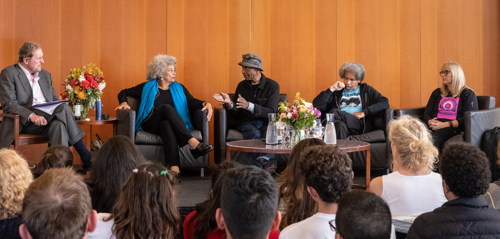Campus News
Speakers challenge audience to rethink modern incarceration
Angela Davis returns to UC Santa Cruz with the two surviving members of the ‘Angola 3’ to discuss solitary confinement and call on society to transform itself to no longer rely on prison repression.

Angela Davis-craig Haney Social Justice Panel 5/22/18

Mass incarceration, solitary confinement, and the possibility for meaningful change in the American prison system took center stage in the standing-room-only Bhojwani Room of the University Center on May 22.
Distinguished Professor of Psychology Craig Haney introduced the panel of speakers by saying all four have experienced the criminal justice system from the inside and now devote their lives to its abolition. Angela Davis was held in prison for 16 months before she was acquitted of the charges related to a 1970 shooting. Debbie Kilroy spent three years locked up for selling cannabis during an undercover police sting in Australia. Robert King and Albert Woodfox served a total of 72 years in solitary confinement — 29 years for King and 43 for Woodfox — at Louisiana’s notorious Angola Prison.
On display was a large photo of the third member of the “Angola 3,” Herman Wallace, who died of cancer three days after he was released. All three were imprisoned in 6-foot-by–9-foot cells at what was once a 19th-century slave plantation.
“It’s helpful to recognize that punishment in the form of imprisonment bears a direct relationship to slavery,” said Davis, an iconic activist and distinguished professor emerita at UC Santa Cruz. Davis was a professor in the History of Consciousness Department for 17 years until her 2008 retirement.
The emergence of what’s called mass incarceration can be traced back to the 19th century, right after slavery was outlawed, when “free black bodies had to be managed,” she said. Now the United States, with just 5 percent of the world’s population, has 25 percent of the world’s prisoners—or 2.2 million people in jails, detention centers and prisons, and a disproportionate number of them are black.
Woodfox also referred to slavery when he talked about the economic exploitation of prison labor by major corporations. “Every prisoner represents profit,” he said. “The irony is that companies will freely use ‘slave labor’ to produce their products, but if an individual is lucky enough to be released from prison, they won’t hire him … now he’s of no value to them.”
Haney, a leading expert on the psychology of imprisonment, suggested that today’s prison system has more than a historical or metaphorical connection with slavery.
“It is a literal embodiment of what slavery was and still is,“ Haney said. ”You look around, and you see mostly African-American men working in the fields, overseen by mostly white men on horseback, with rifles over their laps, and this is today. This isn’t the Jim Crow era. You blink your eyes and you don’t know what century you’re in.”
When it comes to solitary confinement, what was created as a means of punishment became the warehousing of a segment of society, said Woodfox, who was released in 2016 after being in confinement since 1972.
Initially jailed for armed robbery, Woodfox was later charged with the murder of a prison guard. Eventually, judges upheld unanimously that his murder conviction had been secured as a result of racial discrimination.
Looking at King and Woodfox, Haney said, “Both of you, and Herman, as well, had exemplary records while you were in solitary confinement. It had nothing to do with you continuing to engage in infractions and getting punished for them. It had to do with who you were and the system deciding it wanted to keep you there, essentially, forever. It’s an example of the system giving up on people for all time.”
Kilroy, the only convicted drug trafficker to be admitted as a lawyer in Australia, said it’s contradictory to use the term “justice system,” because there’s nothing “just” about it. She and others on the panel advocate “decarceration” strategies rather than prison reform, saying, “It’s a myth that reform helps anyone that’s captured in the prison industrial complex.”
As Davis put it, the pendulum of reform has swung back and forth for 200 years, and the prison system has only become stronger and more permanent. “It’s time to recognize that reform hasn’t worked, and more than likely, it’s not going to work in the future.”
She calls for a transformation of society so it no longer relies on prison repression, describing a process of “discovering, imagining, creating a form of justice that heals” and ends the cycle of retribution.
“Even if this does not seem to be immediately on the horizon, even if this seems to be so far in the future that it seems to constitute the musings of an idealist, we still have to do it. Even if we don’t get to experience (the results of) it, other generations will.”
Davis said social activists everywhere help this cause when they advocate for better education and housing, and address gender violence.
King said he doesn’t know if there is a solution, “but I sure know that imprisonment is not the answer.”
If nothing else, Woodfox said, “We have to start seeing humanity in a different light.”